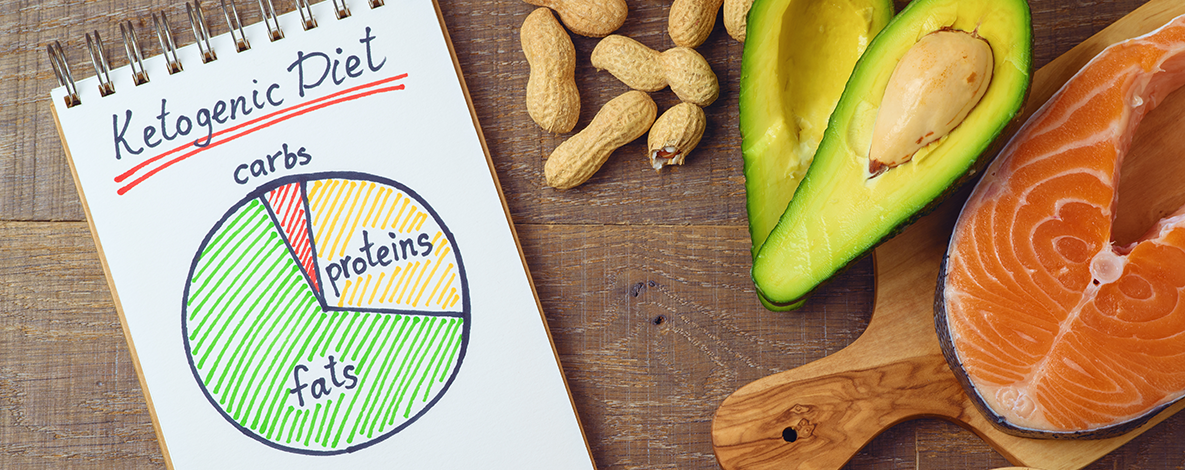What You Need to Know About the Keto Diet

The Ketogenic diet, also commonly referred to as the “Keto” diet, originated for managing various conditions such as Epilepsy. This intervention required close supervision with medical professionals because of the complexity of the diet and health considerations.

Fast forward to the present time, and the Keto diet has taken on a reputation as a potential weight loss diet. An eating plan on a ketogenic diet consists of very low carbohydrates, high fat, and moderate protein intake. Carbohydrate intake on a Keto diet can be as low as 5% of your daily calories and fat as high as 90% of daily calories. However, many Keto diets for weight loss vary in their recommendations. Because of Keto’s popularity, many consumers who eat lower carbohydrates have termed their diet a keto diet. However, depending on an individual’s needs and intake, they may not be reaching a state of Ketosis and, in reality, are not following the true definition of the Ketogenic diet.

How it Works
Carbohydrates are the body’s primary source of energy. When carbohydrates are restricted in the diet and stored glucose is depleted, the body switches to a new fuel source through fatty acids, termed Ketones. Ketones are used to provide fuel to the brain and other tissues in the body. This process is called Ketosis and can take up to a week to achieve depending on the individual.

Foods Eaten on a Keto Diet
Foods eaten on the Keto diet are typically high in fat. Additionally, protein sources such as meat, fish, eggs, cheese, and non-starchy vegetables are encouraged. Many Keto recipes include saturated fats from sources such as meats, cheese, and butter. Heart-friendly unsaturated fats are also allowed on a keto diet, like nuts, avocados, and olive oil.

Foods Avoided on a Keto Diet
A Keto diet for weight loss consists of low carbohydrate intake. Most Keto diets recommend less than 50 grams of carbohydrates a day, with some as low as 20 grams a day (equivalent to one apple). Carbohydrate-containing foods often avoided on the Keto diet include grains, dairy-containing carbohydrates, starchy vegetables, foods containing added sugars, and fruit. However, higher fiber fruits are sometimes included.

Pros of a Keto Diet
The Keto diet for weight loss has shown beneficial results in the short term, including weight loss, improvement in insulin resistance, and improvement in other health conditions such as high blood pressure. Two theories regarding the weight-loss impact of the Keto diet include reduced food cravings due to higher fat intake and decreased insulin levels. However, it is important to note that a majority of the studies assessing the benefits of the Keto diet for weight loss are shorter than six months in length. Long-term studies are limited at this time.

Cons of a Keto Diet
A high fat, low carbohydrate diet can be challenging to sustain. One reason for this is the potential side effects that avoiding carbohydrates can cause:
- “Keto Flu”
-
- Symptoms such as headaches, fatigue and dizziness due to a significant reduction of carbohydrate intake have been reported. The length of the symptoms varies
- Constipation
- Cutting back on carbohydrates reduces intake of many common fiber foods such as high fiber starchy vegetables, fruits, and whole grains. If not monitored, this could increase the risk of constipation.
- Nutrient deficiency
- Reducing or eliminating a large macronutrient group, in this case, carbohydrates, comes with deficiency risk. Decreased intake of nutrient-rich vegetables, fruits, and grains can increase the risk of deficiency in vitamin A, C, K, folate, and other important nutrients.
Due to increased fat in the diet, specifically saturated fat, regular monitoring of lab work for cardiovascular health is recommended. Additionally, this diet is not appropriate for everyone, and consulting a medical professional is recommended. According to the American Heart Association and the Dietary Guidelines for Americans, saturated fat intake should be limited due to its negative impact on cardiovascular health. Lastly, due to the difficulty of sustaining such a restrictive, low carbohydrate diet, research is limited to a Keto diet’s long-term effects.

Individual Approach
There are several interpretations of the Keto diet for weight loss. Taking an individualistic approach is key to finding what works best for your health and goals. Those interested in a Keto diet for weight loss may also find success with a less restrictive approach. Additionally, the Keto diet’s long-term findings are limited, and the sustainability of this diet has its challenges and considerations. Therefore, if someone is looking to implement this diet, it is highly recommended to consult a doctor and a registered dietitian.

Eat Right. “What is the Ketogenic Diet”
Pennsylvania Academy of Nutrition & Dietetics. “The Low Down on Keto”
Harvard T.H. Chan. “Diet Review: Ketogenic Diet for Weight Loss.”
- Accessed at https://www.hsph.harvard.edu/nutritionsource/healthy-weight/diet-reviews/ketogenic-diet/
US National Library of Medicine National Institutes of Health. “Scientifically Proven Diets that Work.”
Cambridge Core. “Very-low-carbohydrate ketogenic diet v. low-fat diet for long-term weight loss: a meta analysis of randomised controlled trials.”
- Accessed at https://doi.org/10.1017/S0007114513000548
Dietary Guidelines for Americans. “Dietary Guidelines for Americans 2020-2025.”
Download the Free Resource
Access a printer-friendly version of the resource to reference later.